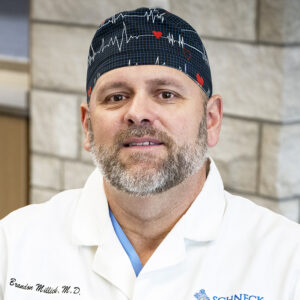
Colon Cancer Surgery
Discover solutions and support for colon cancer at Schneck.
What Is Colon Cancer Surgery?
Colon cancer surgery involves the removal of part or the whole colon, a vital organ in the digestive system responsible for waste removal. At Schneck Surgical Associates, our experienced team performs colectomies, a common type of colon surgery, to treat colon cancer. This form of treatment may also be necessary to treat various colon diseases, including other forms of cancer, Crohn's disease, or ulcerative colitis. Colon issues from injuries, congenital disabilities, or bowel obstructions can also resolve with colectomies.
What Condition Does Colon Cancer Surgery Treat?
Colon cancer surgery addresses colon cancer, a type of cancer affecting the large intestine. Colon cancer often begins as benign polyps and abnormal growths within the colon lining. If left untreated, polyps can become cancerous. Then, they may lead to symptoms such as changes in bowel movements, fatigue, unexplained weight loss, and bloody stools. Timely diagnosis and treatment, including colectomy, may be necessary to manage colon cancer.

What Are the Risks of Colon Cancer Surgery?
While colon cancer surgery is a crucial treatment option, it comes with potential risks and considerations. Risks associated with colon surgery include infection, bleeding, and reactions to anesthesia. It's essential to consult with our team to know potential risks, benefits, and personalized treatment plans. We promptly address risks with patients if they arise and provide a thorough resolution.
Learn about Colon Cancer Surgery at Schneck
At Schneck Cancer Center, expert medical teams tailor colon cancer surgery to each patient. Like any surgical procedure, colectomies involve fasting before the surgery. Then, there's a hospital stay afterward for patient monitoring. Our approach accounts for factors such as the lesion location and the extent of cancer spread. Conventional open surgery involves an abdominal incision. Sometimes, it requires a more extended hospital stay. Less invasive surgery with laparoscopic or robotic tools creates a smaller incision for a swifter recovery. Our teams reconnect the colon after cancer removal, enabling normal digestive function. In cases where reconnection isn't possible, patients may receive a colostomy. We offer state-of-the-art cancer care with cutting-edge technologies for comprehensive support. Consult with your provider for further details.

Your Providers
Our patients receive specialized solutions and support from providers.

Amanda M. Dick, MD
General Surgery, da Vinci Surgery View Info »
Cathy R. Hildebrand, NP
Surgery View Info »
Joyce R. Iwema, MD
General Surgery, da Vinci Surgery View Info »
Susan Maurer, MD
General Surgeon, da Vinci Surgery View Info »
G. Brandon Millick, MD
Bariatrics/Surgical Weight Loss, General Surgery, da Vinci Surgery View Info »
Antonio Spates, MD
General Surgery, da Vinci Surgery View Info »
Taylor Ulrey, FNP
Surgery View Info »Find the Support Your System Needs
Colon cancer surgery plays a pivotal role in treating colon cancer and related conditions. If you have concerns about your colon health or are facing a diagnosis, we are here to guide you. Please don't go through it alone, from screenings to personalized treatment plans. Taking control of your colon health begins with early detection and expert care.
